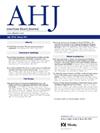Transcoronary cooling and dilution for cardioprotection during revascularisation for ST-segment elevation myocardial infarction: Design and rationale of the STEMI-Cool study
IF 3.7
2区 医学
Q1 CARDIAC & CARDIOVASCULAR SYSTEMS
引用次数: 0
Abstract
Background
ST-segment elevation myocardial infarction (STEMI) is treated with immediate primary percutaneous coronary intervention (pPCI) to restore coronary blood flow in the acutely ischaemic territory, but is associated with reperfusion injury limiting the benefit of the therapy. No treatment has proven effective in reducing reperfusion injury. Transcoronary hypothermia has been tested in clinical studies and is well tolerated, but is generally established after crossing the occlusion with a guidewire therefore after initial reperfusion, which might have contributed to the neutral outcomes. Transcatheter strategies may also offer additional benefit through haemodilution and the resultant controlled reperfusion, but this has not been fully investigated for pPCI.
Design
STEMI-Cool is a pragmatic, registry-based randomised clinical pilot trial to test the recruitment rate, feasibility, and safety of a simple transcoronary cooling and dilution protocol. Sixty STEMI patients undergoing pPCI will be randomised 1:1 to standard of care or continuous infusion of room temperature saline through the guiding catheter to achieve intracoronary temperature reductions of 6 to 8°C, commencing before crossing the coronary occlusion with a guidewire. Mechanistic outcome measures will include microvascular resistance, biomarkers of inflammation before infusion and at 24 hour, and magnetic resonance imaging of myocardial salvage and infarct size.
Conclusions
STEMI-Cool will investigate the recruitment rate, feasibility and safety of an innovative and simple cooling and diluting strategy for cardioprotection before and during reperfusion with pPCI, aiming to address limitations faced in other studies. Mechanistic outcome measures will allow insight into inflammatory, microvascular and structural changes induced by transcoronary cooling and dilution.
经冠状动脉冷却和稀释用于st段抬高型心肌梗死血运重建期间的心脏保护:STEMI-Cool研究的设计和基本原理
背景:st段抬高型心肌梗死(STEMI)可以通过立即原发性经皮冠状动脉介入治疗(pPCI)来恢复急性缺血区域的冠状动脉血流,但与再灌注损伤相关,限制了治疗的益处。没有任何治疗方法被证明能有效减少再灌注损伤。经冠状动脉低温已在临床研究中进行了测试,并且耐受性良好,但通常在用导丝穿过闭塞后建立,因此在初始再灌注后建立,这可能是中性结果的原因。经导管策略也可以通过血液稀释和由此产生的控制再灌注提供额外的益处,但这还没有对pPCI进行充分的研究。STEMI-Cool是一项实用的、基于注册的随机临床试验,旨在测试简单的经冠状动脉冷却和稀释方案的招募率、可行性和安全性。60名接受pPCI的STEMI患者将按1:1随机分组,分别接受标准治疗或通过引导导管持续输注室温生理盐水,以实现冠状动脉内温度降低6-8°C,并在导丝穿过冠状动脉闭塞之前开始。机械结果测量将包括微血管阻力、输注前和24h时的炎症生物标志物、心肌恢复和梗死面积的磁共振成像。结论:STEMI-Cool将研究一种创新和简单的冷却和稀释策略在pPCI再灌注前和再灌注期间的心脏保护的招募率、可行性和安全性,旨在解决其他研究面临的局限性。机械结果测量将允许深入了解经冠状动脉冷却和稀释引起的炎症、微血管和结构变化。
本文章由计算机程序翻译,如有差异,请以英文原文为准。
求助全文
约1分钟内获得全文
求助全文
来源期刊

American heart journal
医学-心血管系统
CiteScore
8.20
自引率
2.10%
发文量
214
审稿时长
38 days
期刊介绍:
The American Heart Journal will consider for publication suitable articles on topics pertaining to the broad discipline of cardiovascular disease. Our goal is to provide the reader primary investigation, scholarly review, and opinion concerning the practice of cardiovascular medicine. We especially encourage submission of 3 types of reports that are not frequently seen in cardiovascular journals: negative clinical studies, reports on study designs, and studies involving the organization of medical care. The Journal does not accept individual case reports or original articles involving bench laboratory or animal research.
 求助内容:
求助内容: 应助结果提醒方式:
应助结果提醒方式:


